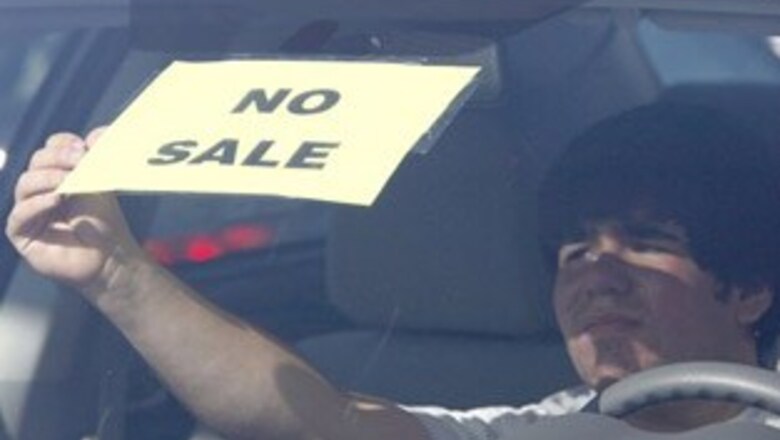
views
New York: Toyota executives have been virtually silent amid a recall of millions of their cars because gas pedals can become dangerously stuck. For their customers, oh, what a feeling--fear, frustration, confusion and anger.
Since Tuesday, when the Japanese automaker said it would stop making and selling some of its top-selling models, the company has had few answers for dealers and drivers--most notably about when Toyota owners could get their cars fixed and hit the road without worrying.
"I'm stuck with this car," said Tony Raasch of Hales Corners, Wisconsin, who said he hit another driver in his 2010 Corolla two weeks ago when the car suddenly accelerated. "I really don't know what to do. I just feel--I guess--ripped off is the best way to put it."
Toyota first recalled 2.3 million vehicles, including the popular Camry and Corolla, because of faulty gas pedals. Later in the week, it expanded the recall to Europe and recalled 1.1 million more in the US because of floor mats that can catch the accelerator.
Three days after the recall announcement, there was still no indication of how long it might take to get the affected Toyotas fixed or whether that would involve repairing the gas pedal systems or replacing them altogether.
It took until Friday for CEO Akio Toyoda to make his first public comments about the recalls. Buttonholed by a camera crew at the World Economic Forum in Davos, Switzerland, he told Japanese broadcaster NHK: "I am very sorry that we are making our customers feel concerned."
In its worst crisis in recent memory, the company has communicated with the public mostly through a series of very limited statements. One spokesman, Brian Lyons, said initially he was restricted to describing the problem as "rare and infrequent."
The company said it began shipping gas pedal parts to its dealers Friday, but could not say when they would arrive. Toyota said details on the fix will be made available sometime next week.
Among Toyota's famously loyal customer base, frustration and anger mounted through the week.
Laurie Strong, a nurse from Bristol, Rhode Island, drives a 2010 Camry and said she noticed the gas pedal seemed too sensitive-- "0 to 40 in a parking lot"--when she bought the car last summer. She went to the dealership Wednesday and refused to drive it anymore.
Strong, who was ultimately given a Kia, said she had repeatedly dialed a Toyota hot line only to get a message saying it could not handle calls. A Toyota customer for years, she now says she's put off.
"I would be less upset and less confused if I had a person on the other end of the phone who could talk to me and tell me what my options are--what they think quite honestly, what the time frame for figuring this out and putting this into motion."
It made for a maddening week for Toyota dealers, too. Jason Stewart, general manager of a dealership in North Palm Beach, Florida, said he doesn't know what to tell customers and has found out more about the problem from watching the news than from Toyota.
"People on the phone, they're very scared," said Douglas Lima, the service manager at Toyota Central in downtown Los Angeles. "I received phone calls screaming and yelling and using bad words. You just hear them out."
On Friday, Toyota's Web site was featuring bold, brightly colored ads for its cars and trucks, like the Prius and the 4Runner. At the bottom of the home page was a small strip with a link to information on the recall.
PAGE_BREAK
Even some prominent rental-car companies went further than Toyota did, sending their customers e-mails throughout the week keeping them posted--in most cases saying they were removing all of the affected models from their fleets.
Toyota's response, by contrast, has left experts in crisis management scratching their heads. Some wondered why Toyota didn't mount a full-court press--full-page ads in newspapers, executives readily available to the morning shows, ramped-up customer service.
Toyota is certainly no stranger to advertising. The company alone--not its dealers--spent $629.4 million on it in the first nine months of last year, according to Kantar Media, which tracks advertising spending.
A simple, honest, humble message would have gone a long way, said Jonathan Bernstein, president of Bernstein Crisis Management. He said the company should have sent the word out online, by e-mail, with letters--whatever it takes.
His suggestion: Toyota should say it was as surprised as anyone by the scope of the problem and deeply regrets the inconvenience, and pledge to get up to speed as quickly as possible and provide regular updates.
"Anytime there's a threat to health or safety, there's nothing that creates bigger concern. Nothing that freaks people out more," he said. "You're dealing with very intense feelings, and that requires sensitive and appropriate communications."
The Associated Press requested interviews Friday with Yoshi Inaba, chairman and CEO of Toyota Motor North America, the company's top U.S. executive. It also requested interviews with other top executives. A spokesman said he would look into the request. Telephone and e-mail messages left for the safety public relations team at Toyota were not returned Friday.
In the meantime, drivers like Johnathan Jones, who lives in Fort Mitchell, Alabama, and has a 30-mile commute each way in his 2009 Tundra, will keep waiting.
"I've got a $30,000 vehicle and they don't even know how to fix it," he said, huffing. "To me, it's a big safety hazard with my children. I don't want to even put them in there."




















Comments
0 comment